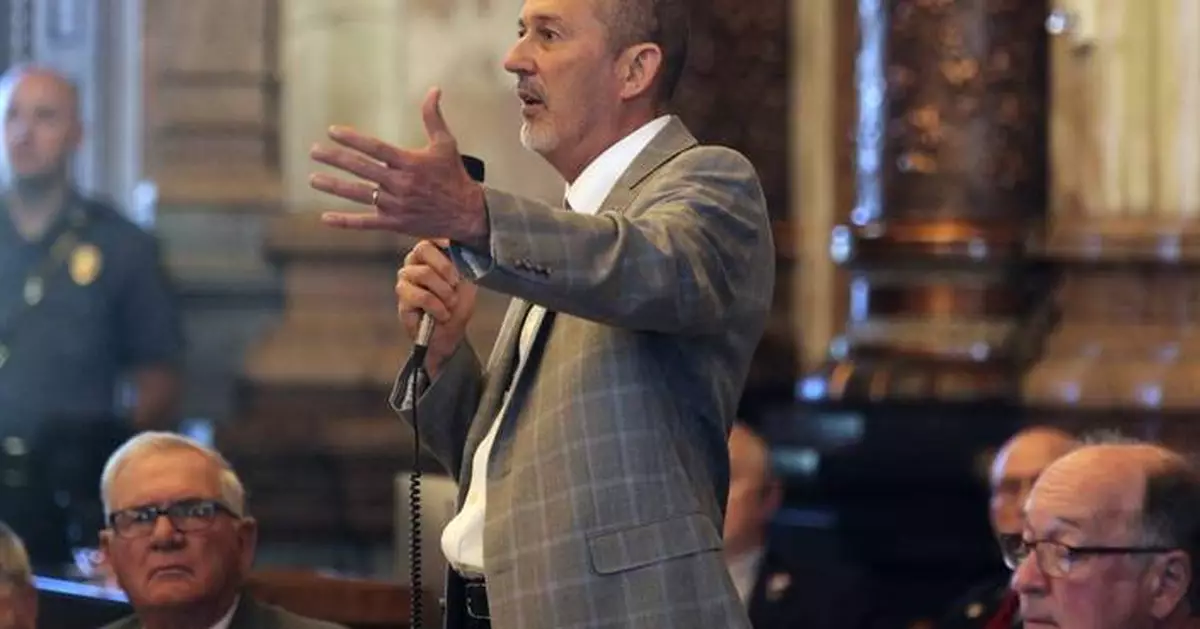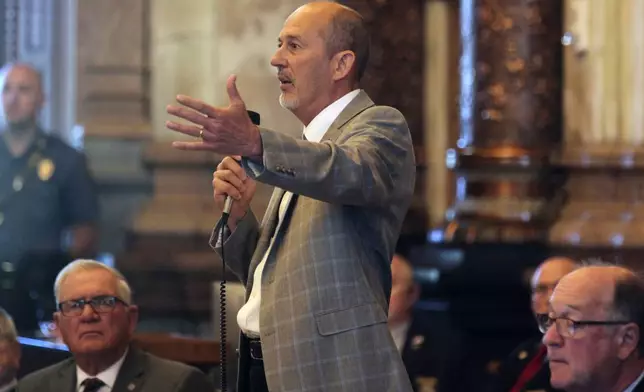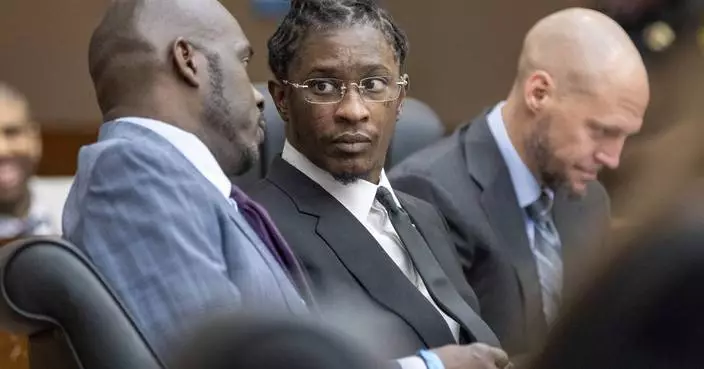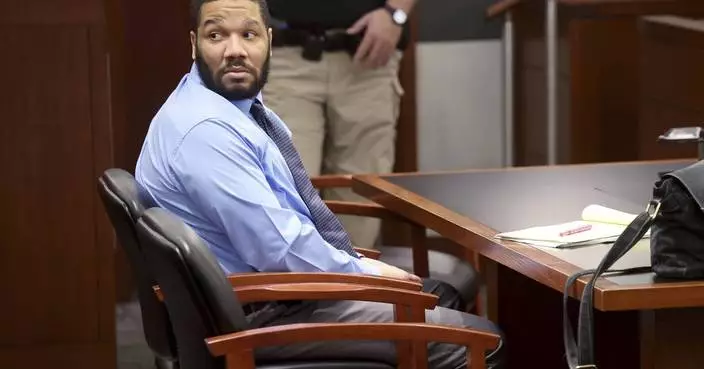TOPEKA, Kan. (AP) — A proposed ban on gender-affirming care for transgender minors in Kansas died Monday when two Republicans switched their votes and prevented the Republican-controlled Legislature from overriding the Democratic governor's veto of the measure.
The Kansas House voted 82-43 to overturn Gov. Laura Kelly's veto of a bill that also would have barred state employees who work with children from promoting social transitioning for kids who question or struggle with their gender identities. But supporters were two votes short of the necessary two-thirds majority.
Click to Gallery
Lobbyists Brittany Jones, left, of the conservative group Kansas Family Voice, and Lucrecia Nold, right, of the Kansas Catholic Conference, watch from the Senate's west gallery as members debate overriding a proposed ban on gender-affirming care for minors, Monday, April 29, 2024, at the Statehouse in Topeka, Kan. Both of their organizations support a ban. (AP Photo/John Hanna)
Isaac Johnson, who just completed an internship with Topeka's public schools and is finishing work on a social work degree, talks to reporters during a news conference, Thursday, April 26, 2024, in front of a mural at the Statehouse in Topeka, Kan. Johnson, who is transgender, worries about the effects of a proposed ban on gender-affirming care for minors, which also would bar state employees from promoting social transitioning for youth. (AP Photo/John Hanna)
Small transgender rights flags sit on the desk in the Kansas House chamber for Rep. Allison Hougland, D-Olathe, during a break in the House's daylong session, Monday, April 29, 2024, at the Statehouse in Topeka, Kan. Hougland, other Democrats, and a few Republicans have prevented the GOP-controlled Legislature from overriding Democratic Gov. Laura Kelly's veto of a proposed ban on gender-affirming care for transgender minors. (AP Photo/John Hanna)
Kansas state Rep. Jesse Borjon, R-Topeka, speaks on his phone at his desk in the House chamber during a break in the House's daylong session, Monday, April 29, 2024, at the Statehouse in Topeka, Kan. Borjon has switched from voting for a proposed ban on gender-affirming care for minors to voting against overriding Democratic Gov. Laura Kelly's veto of the measure. (AP Photo/John Hanna)
Kansas Senate Minority Leader Dinah Sykes, D-Lenexa, speaks against overriding Democratic Gov. Laura Kelly's veto of a proposed ban on gender-affirming care for minors. Sykes argues that the ban would deny transgender children crucial care that helps lessen severe depression and suicidal tendencies. (AP Photo/John Hanna)
Kansas state Sen. Tom Holland, D-Baldwin City, speaks against overriding Democratic Gov. Laura Kelly's veto of a proposed ban on gender-affirming care for minors, Monday, April 29, 2024, at the Statehouse in Topeka, Kan. Holland suggested that the ban would send a message that Kansas is not welcoming. (AP Photo/John Hanna)
Lobbyists Brittany Jones, left, of the conservative group Kansas Family Voice, and Lucrecia Nold, right, of the Kansas Catholic Conference, watch from the Senate's west gallery as members debate overriding a proposed ban on gender-affirming care for minors, Monday, April 29, 2024, at the Statehouse in Topeka, Kan. Both of their organizations support a ban. (AP Photo/John Hanna)
Isaac Johnson, who just completed an internship with Topeka's public schools and is finishing work on a social work degree, talks to reporters during a news conference, Thursday, April 26, 2024, in front of a mural at the Statehouse in Topeka, Kan. Johnson, who is transgender, worries about the effects of a proposed ban on gender-affirming care for minors, which also would bar state employees from promoting social transitioning for youth. (AP Photo/John Hanna)
Kansas Gov. Laura Kelly speaks at a public event, Monday, April 29, 2024, at the Statehouse in Topeka, Kan. Kelly has vetoed a proposed ban on gender-affirming care for minors that also would bar state employees from advocating social transitioning for transgender children. (AP Photo/John Hanna)
Kansas state Sen. Mark Steffen, R-Hutchison, speaks in favor of overriding Democratic Gov. Laura Kelly's veto of a bill banning gender-affirming care for minors, Monday, April 29, 2024, at the Statehouse in Topeka, Kan. Steffen says the state must protect "confused" children from a "confused health care system and confused parents." (AP Photo/John Hanna)
Republicans who backed the bill argued that a ban would protect vulnerable children from what they described as experimental health care that could create long-term health issues. It would not only have banned surgeries for minors but also puberty blockers and hormone treatments. The Senate voted Monday morning 27-13 to override Kelly’s veto, the exact margin supporters needed there.
Since Kelly vetoed the bill earlier this month, its critics have focused on the provision aimed at keeping state workers from advocating for social transitioning, which under the bill included “the changing of an individual’s preferred pronouns or manner of dress." LGBTQ+ rights advocates said it made Kansas' proposed ban more sweeping than other states' laws.
“I can breathe,” Iridescent Riffel, a transgender LGBTQ+ rights activist who worked against the bill, said in an interview after the House vote. “I'm relieved. I know many other families in Kansas are,” the 27-year old from from northeastern Kansas said.
LGBTQ+ rights advocates questioned whether the provision on social transitioning was written broadly enough to apply to public school teachers who show empathy for transgender students. GOP backers rejected that argument, but the bill didn't spell out what constitutes promoting social transitioning.
“I think the fear is the point,” Taryn Jones, vice chair of the LGBTQ+ rights group Equality Kansas said after the House vote. “The people in those professions would be too afraid to do anything that they weren’t supposed to.”
About 300,000 youths ages 13 to 17 identify as transgender in the U.S., according to estimates by the Williams Institute, an LGBTQ+ research center at UCLA Law. It estimates that in Kansas, about 2,100 youths in that age group identify as transgender.
At least 200 Kansas health care providers signed a letter to lawmakers opposing a veto override. Transgender youth and parents of transgender children described gender-affirming care as life-saving and argued that it lessens severe depression and suicidal tendencies. The care also has been endorsed by the American Medical Association, the American Academy of Pediatrics and other major U.S. medical groups.
Republican state Reps. Jesse Borjon, of Topeka, and Susan Concannon, from rural north-central Kansas, said parts of the bill were too vague for them to vote to override Kelly's veto after both voted for the measure last month.
The bill would have given providers until the end of the year to phase out puberty blockers and hormone treatments for existing patients, but Borjon said he was bothered by how the bill wouldn't have allowed those patients to continue their care after that.
In a brief speech explaining her “no” vote, Concannon told fellow House members, “These decisions belong between the team of professionals and the parents.”
“The youth need our help, not government overreach,” she added. “To all who have reached out, I hear you.”
The Kansas measure was part of a broader push to roll back transgender rights from Republican lawmakers in statehouses across the U.S. Kansas would have been the 25th state to restrict or ban such care for minors, and this week, the South Carolina Senate expected to debate a similar measure that already has passed the state House.
Supporters of the Kansas bill repeatedly cited the recent decision of the National Health Service of England to stop covering puberty blockers as a routine treatment for gender dysphoria in minors.
“Unfortunately, in today’s society, the predator in particular is a woke health care system,” said Republican state Sen. Mark Steffen, a central Kansas anesthesiologist and pain management specialist.
Republican lawmakers in Kansas last year enacted laws barring transgender girls and women from female college and K-12 sports teams and ending legal recognition of transgender residents’ gender identities. Transgender residents no longer can change the listing for “sex” on their driver’s licenses or birth certificates to match their gender identities, something Kelly’s administration had allowed.
The Legislature also approved a gender-affirming care ban last year, but Kelly vetoed it, and GOP supporters didn't have enough votes in either chamber to override her action. But support built this year as most previously skeptical Republicans came aboard.
Kansas Senate Health Committee Chair Beverly Gossage, a Kansas City-area Republican, told her colleagues: “We’re on the right side of history on this.”
State Rep. John Eplee, a northeastern Kansas family physician and one-time skeptic of the ban, said people are seeing children start to transition to a gender other than the one assigned at birth “more and more and more.”
“It’s time Kansas said, ‘Enough. We're going to take a break from this,’” Eplee said during the House's debate Monday.
Democrats in both chambers pushed back against such arguments, and in the Senate, Democratic Leader Dinah Sykes urged her colleagues "to show grace and kindness.”
Jenna Bellemere, a 21-year-old transgender University of Kansas student, said after the House vote that she's been frustrated by the efforts to roll back transgender rights and worries that people are becoming “desensitized” to attacks on the transgender community.
“I feel like we should be able to expect better.”
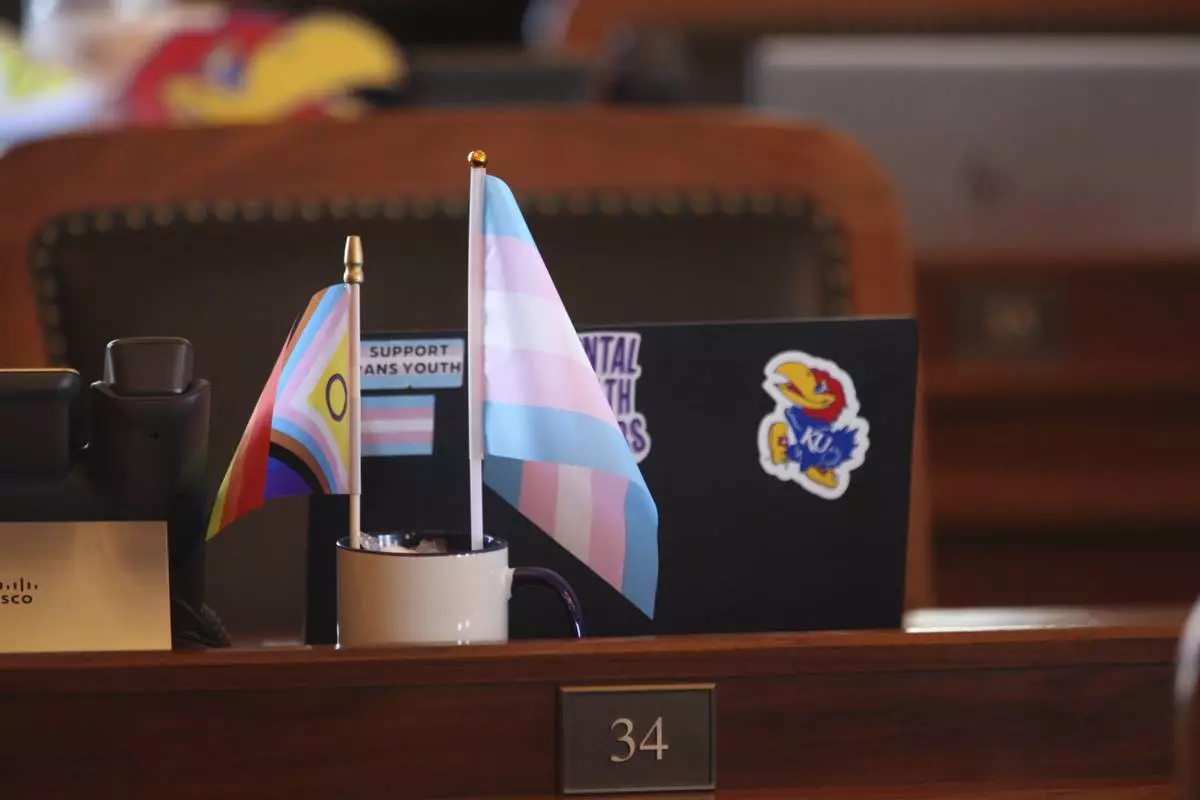
Small transgender rights flags sit on the desk in the Kansas House chamber for Rep. Allison Hougland, D-Olathe, during a break in the House's daylong session, Monday, April 29, 2024, at the Statehouse in Topeka, Kan. Hougland, other Democrats, and a few Republicans have prevented the GOP-controlled Legislature from overriding Democratic Gov. Laura Kelly's veto of a proposed ban on gender-affirming care for transgender minors. (AP Photo/John Hanna)
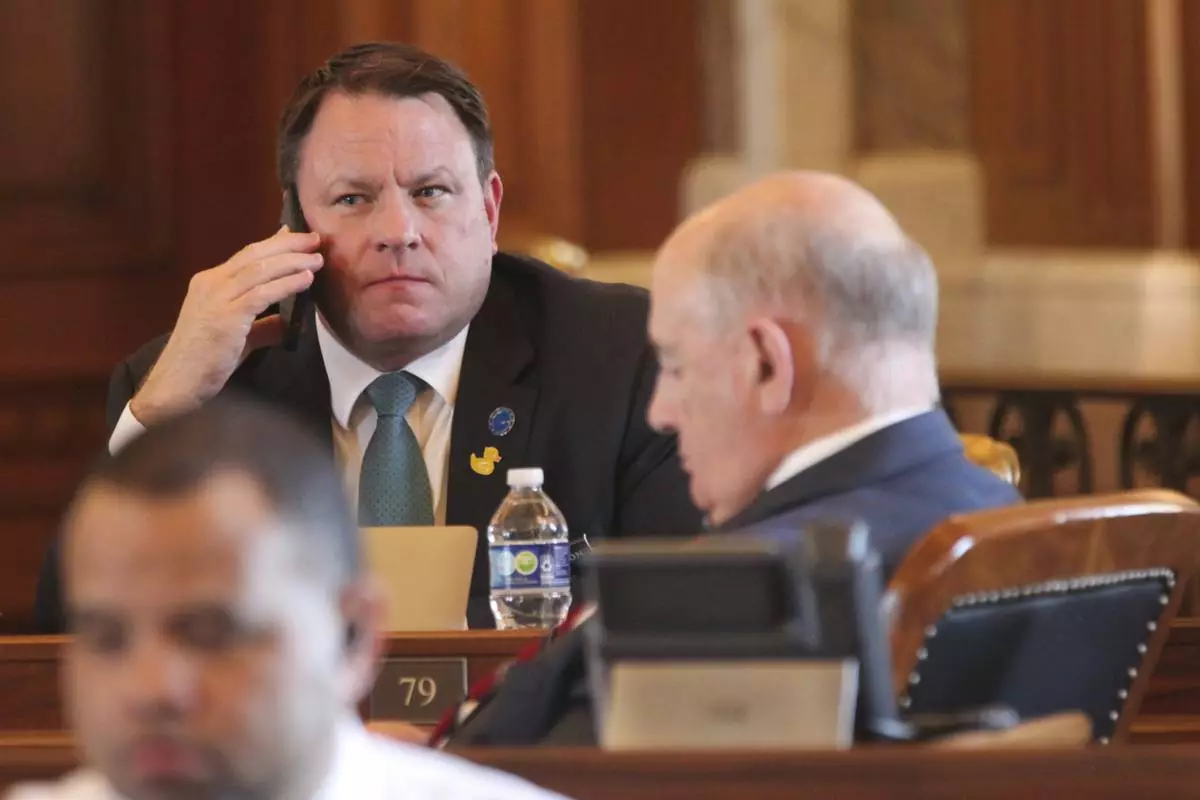
Kansas state Rep. Jesse Borjon, R-Topeka, speaks on his phone at his desk in the House chamber during a break in the House's daylong session, Monday, April 29, 2024, at the Statehouse in Topeka, Kan. Borjon has switched from voting for a proposed ban on gender-affirming care for minors to voting against overriding Democratic Gov. Laura Kelly's veto of the measure. (AP Photo/John Hanna)
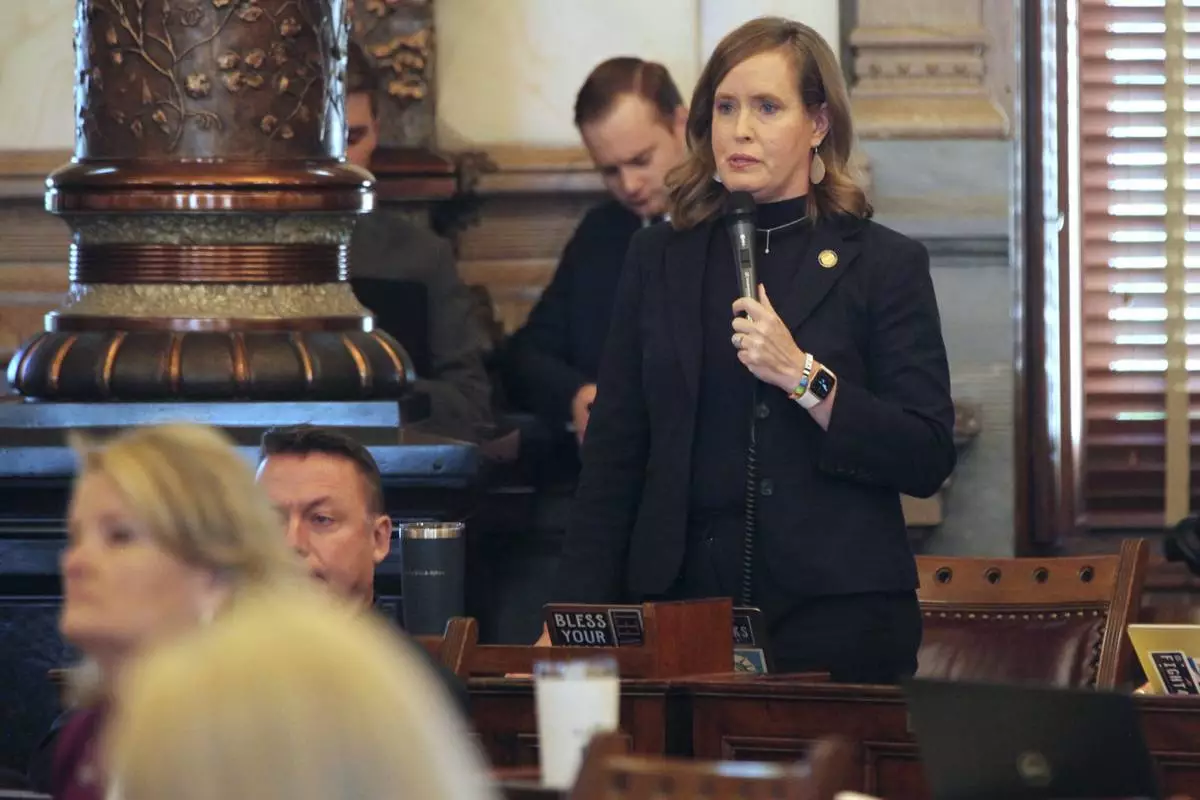
Kansas Senate Minority Leader Dinah Sykes, D-Lenexa, speaks against overriding Democratic Gov. Laura Kelly's veto of a proposed ban on gender-affirming care for minors. Sykes argues that the ban would deny transgender children crucial care that helps lessen severe depression and suicidal tendencies. (AP Photo/John Hanna)
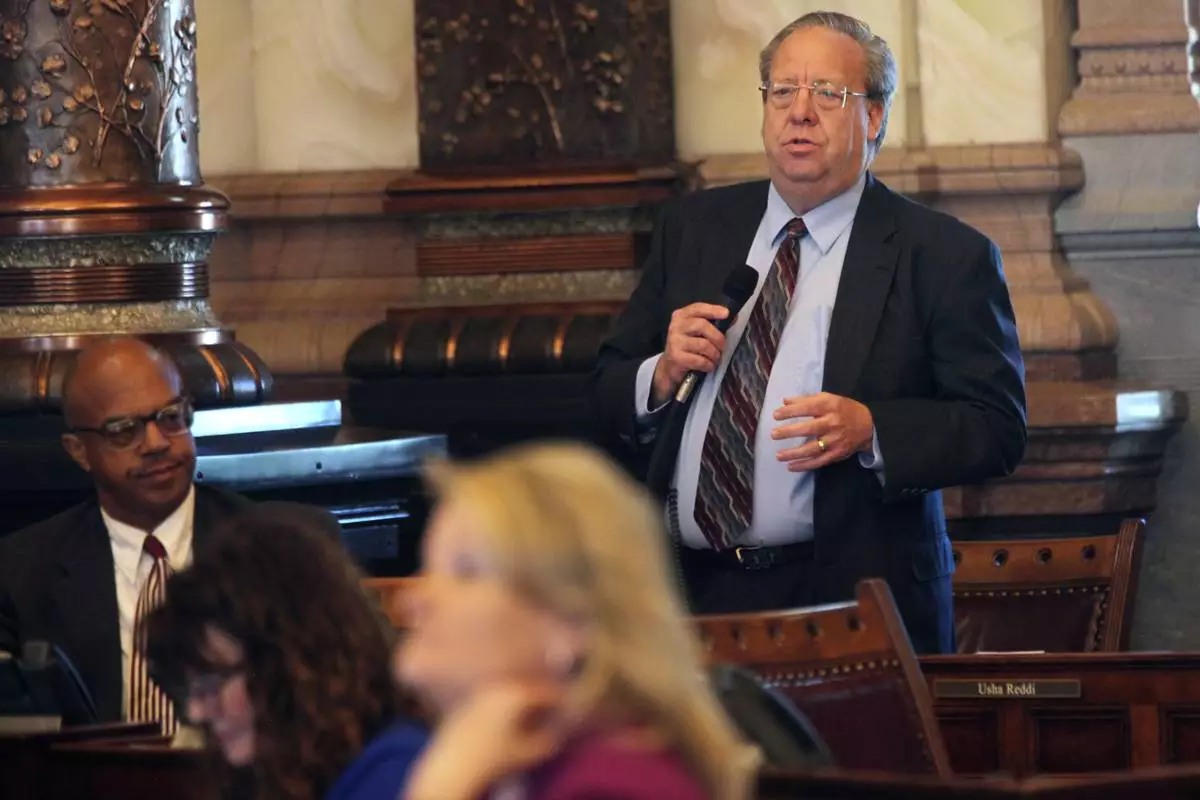
Kansas state Sen. Tom Holland, D-Baldwin City, speaks against overriding Democratic Gov. Laura Kelly's veto of a proposed ban on gender-affirming care for minors, Monday, April 29, 2024, at the Statehouse in Topeka, Kan. Holland suggested that the ban would send a message that Kansas is not welcoming. (AP Photo/John Hanna)
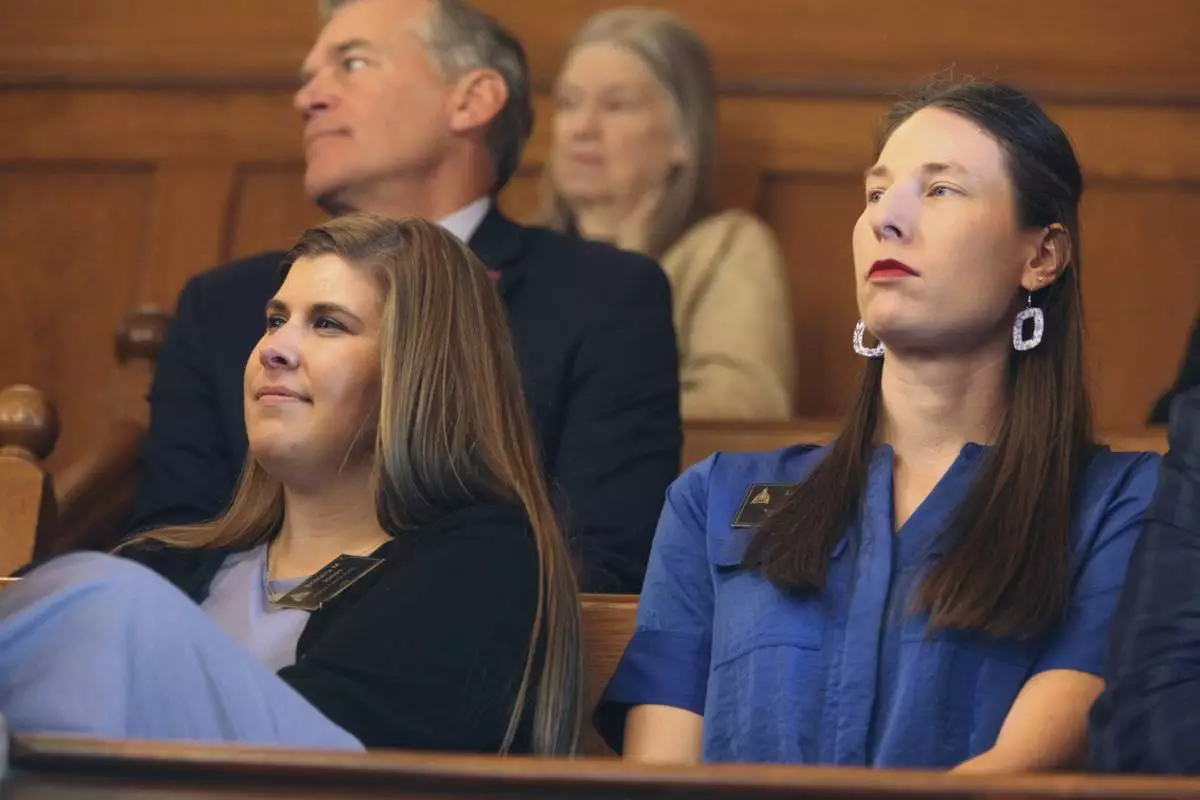
Lobbyists Brittany Jones, left, of the conservative group Kansas Family Voice, and Lucrecia Nold, right, of the Kansas Catholic Conference, watch from the Senate's west gallery as members debate overriding a proposed ban on gender-affirming care for minors, Monday, April 29, 2024, at the Statehouse in Topeka, Kan. Both of their organizations support a ban. (AP Photo/John Hanna)

Isaac Johnson, who just completed an internship with Topeka's public schools and is finishing work on a social work degree, talks to reporters during a news conference, Thursday, April 26, 2024, in front of a mural at the Statehouse in Topeka, Kan. Johnson, who is transgender, worries about the effects of a proposed ban on gender-affirming care for minors, which also would bar state employees from promoting social transitioning for youth. (AP Photo/John Hanna)
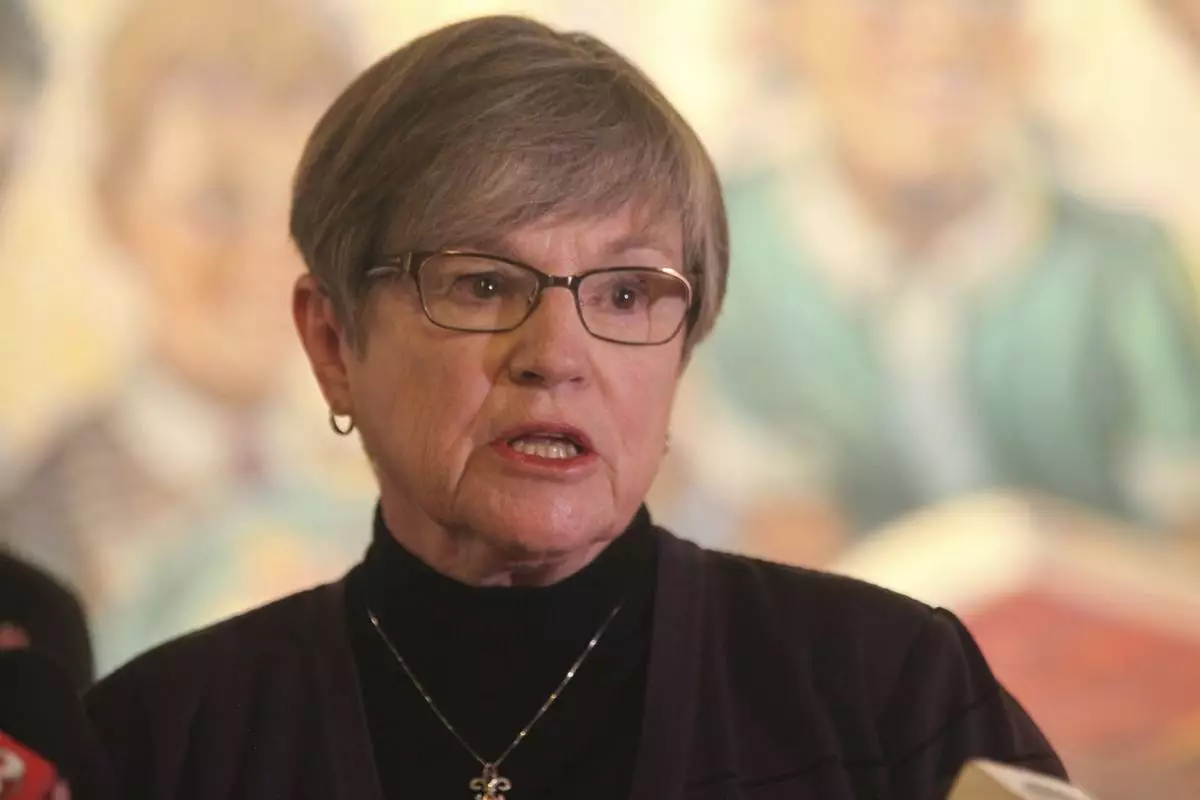
Kansas Gov. Laura Kelly speaks at a public event, Monday, April 29, 2024, at the Statehouse in Topeka, Kan. Kelly has vetoed a proposed ban on gender-affirming care for minors that also would bar state employees from advocating social transitioning for transgender children. (AP Photo/John Hanna)

Kansas state Sen. Mark Steffen, R-Hutchison, speaks in favor of overriding Democratic Gov. Laura Kelly's veto of a bill banning gender-affirming care for minors, Monday, April 29, 2024, at the Statehouse in Topeka, Kan. Steffen says the state must protect "confused" children from a "confused health care system and confused parents." (AP Photo/John Hanna)
RIO DE JANEIRO (AP) — A judge on Thursday handed down long sentences to two former police officers for the 2018 murder of Rio de Janeiro city councilwoman Marielle Franco, an icon of Brazil’ s political left whose killing sparked outrage.
Ronnie Lessa and Élcio de Queiroz were sentenced to almost 79 years and almost 60 years, respectively, for the March 14, 2018 drive-by shooting that killed Franco and her driver, Anderson Gomes. Jurors found that Lessa fired the gun and de Queiroz was the wheelman on the night of the crime.
Lessa and de Queiroz, arrested in 2019, previously signed plea bargains confessing their roles, but the jury had final word on their guilt on homicide and other charges. The verdict, although expected, comes as a measure of solace to the many who saw the martyrdom of the Black, bisexual woman as an attack on democracy, and worried that the crime would go unpunished.
The prosecutors had argued each man should be sentenced to the maximum possible 84 years for the three counts — double homicide, attempted homicide and driving a cloned vehicle.
As Judge Lucia Glioche finished reading the sentence, applause erupted in the room as victims’ families began to cry. Marielle’s sister, Anielle Franco, Brazil’s minister for racial equality, held a long, tearful embrace with her parents and Marielle’s daughter, Luyara Franco. Her father rested his head on the chest of former congressman Marcelo Freixo, who was her political mentor.
Brazilian law does not allow for life imprisonment, and each man will serve no more than 30 years of their sentences. Due to their sealed plea bargains, local media has reported that Queiroz and Lessa may serve 12 and 18 years in prison, respectively, including time already served. Prosecutors have denied their sentenced would be reduced.
Either way, Thursday’s sentencing is seen as only a step toward justice being done, with another trial yet to come for the men accused of ordering her killing. They will also have to pay 706,000 reais ($122,000) in moral damages to several of the victims’ family members and provide an allowance to the young son of Gomes until he turns 24, according to a statement on the court's website.
Known universally by her first name, Marielle, she was raised in one of Rio’s poor communities known as favelas. She became known for her efforts to improve the lives of ordinary residents. Following her election in 2016, she fought against violence targeting women while defending human rights and social programs.
Testimony Wednesday during the first day of the trial offered details about the moments preceding and following the shooting. Franco’s assistant and friend who was also in the car, Fernanda Chaves, was among those giving testimony, as was Franco’s mother and her partner Mônica Benício.
Choked up and often unable to talk, Benício said the last thing Marielle ever said to her was “I love you.”
“We had plans to get married with a wedding party. When Marielle died, what I felt was that they had taken away our promise of the future,” she said, later adding that the right to a just city was one of Marielle’s causes.
“Marielle also defended the right to decent housing from the perspective of the favela, the periphery, this was the theme of the city’s rights agenda.”
Both defendants participated in the trial by videoconference from prison. Lessa is in Sao Paulo while de Queiroz is in Brazil’s capital, Brasilia.
Federal authorities started investigating the case in earnest once leftist President Luiz Inácio Lula da Silva took office in 2023.
With Lessa and de Queiroz sentenced, attention will now turn to the men accused of ordering the hit: two brothers with purported ties to criminal groups known as militias, which illegally charge residents for various services, including protection.
Guilhermo Catramby, a Federal Police detective, told the court Wednesday that the assassination was “undoubtedly” motivated by Marielle’s work regarding land rights, especially in the west side of Rio de Janeiro. Her work there was “a thorn in the side of militia interests,” Catramby said.
In March, Federal Police detained the two brothers, federal lawmaker Chiquinho Brazão and his brother Domingos Brazão, a member of Rio state’s accounts watchdog. They have denied any involvement in the killing or with militias and have yet to go on trial.
In his plea bargain, Lessa told police that the politician brothers hired him and informed him that the then-chief of the state’s civil police, Rivaldo Barbosa, had signed off beforehand. Barbosa, who also denies any involvement, was arrested in March.
Marielle’s family and Ágatha Arnaus, widow of Gomes, spoke to journalists after the trial. Holding hands, they said that while the conviction offered some reparation after years of struggle and pain, it was just the first step in a long journey toward justice.
“I wanted my mother here, but today will certainly go down in this country’s democratic history,” said Luyara, the councilwoman’s daughter, holding back tears.
“If the justice system had not convicted these two cruel murderers, we wouldn’t have a moment of peace. But this doesn’t end here,” said Antonio Francisco da Silva, Marielle’s father. “There are those who ordered the crime. Now the question is: when will those who ordered it be convicted?”
Sá Pessoa reported from Sao Paulo.
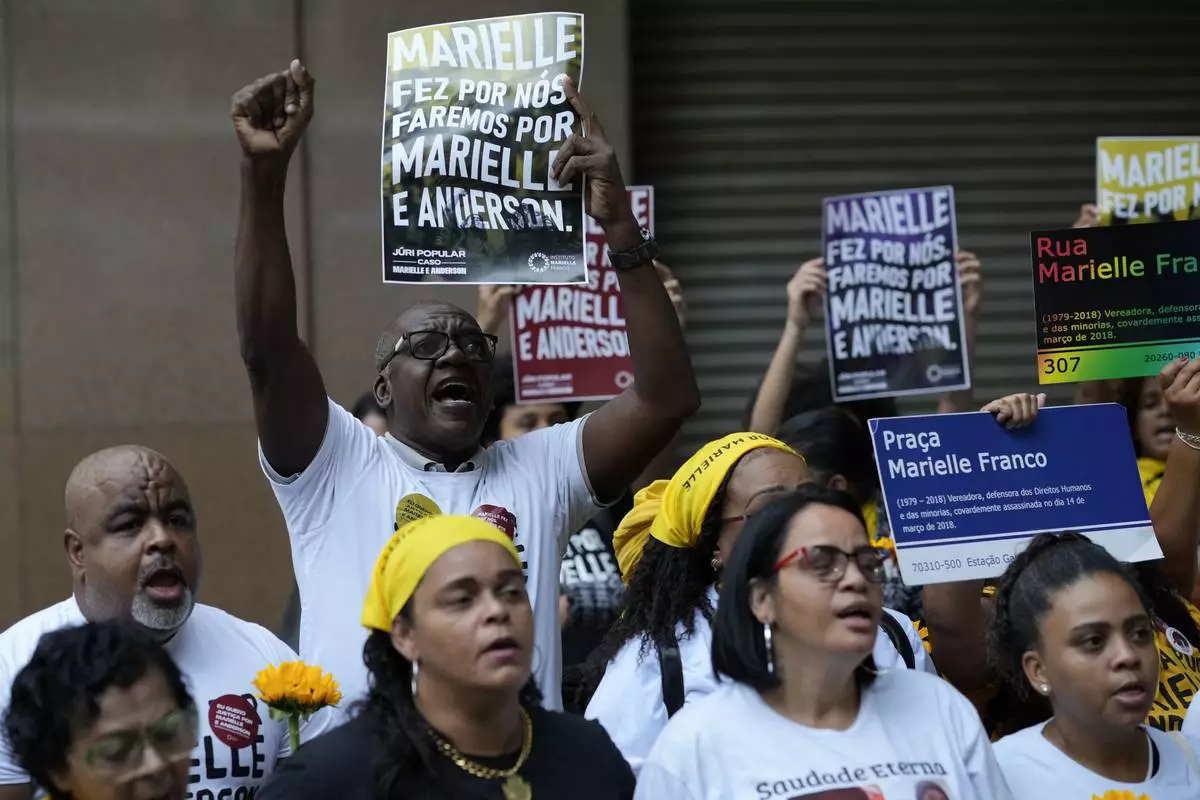
People attend a rally prior to the trial of former Rio de Janeiro city councilwoman Marielle Franco's alleged killers outside the Court of Justice, in Rio de Janeiro, Wednesday, Oct. 30, 2024. (AP Photo/Silvia Izquierdo)
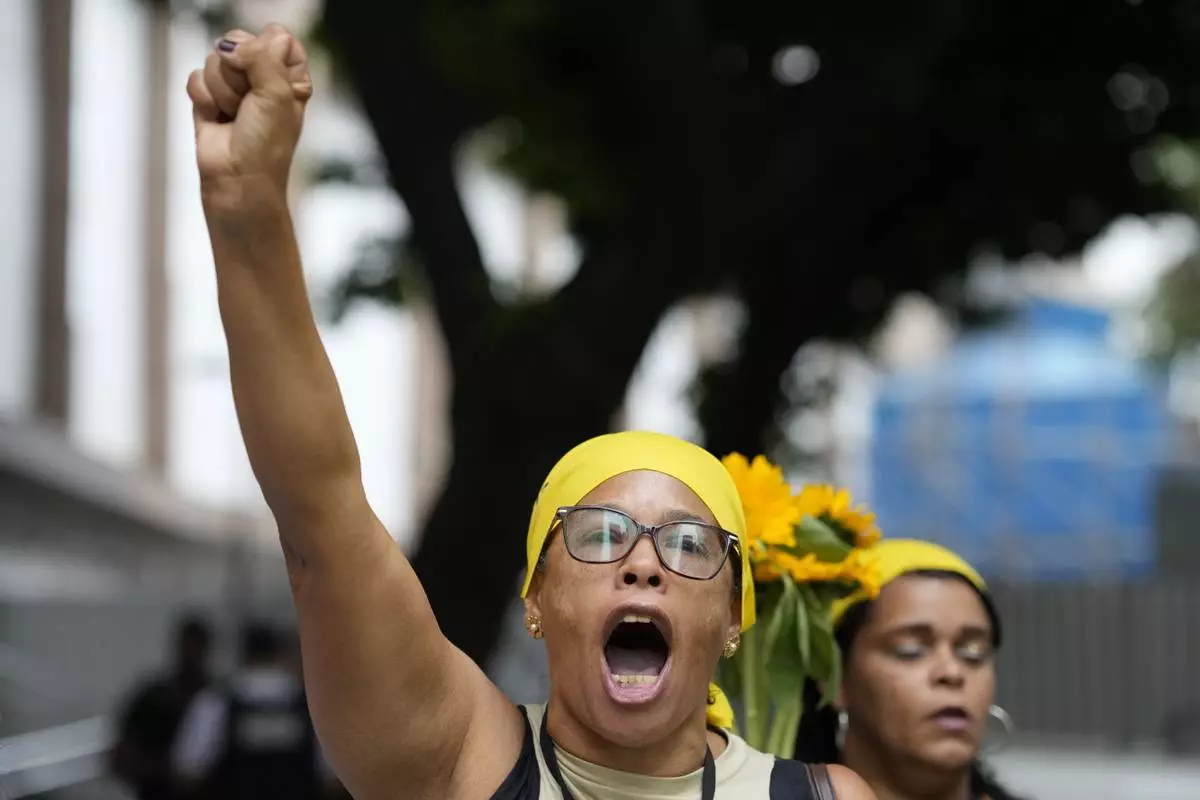
A woman shouts demanding justice before the start of the trial of councilwoman Marielle Franco’s suspected murderers, outside the Court of Justice, in Rio de Janeiro, Brazil, Wednesday, Oct. 30, 2024. (AP Photo/Silvia Izquierdo)
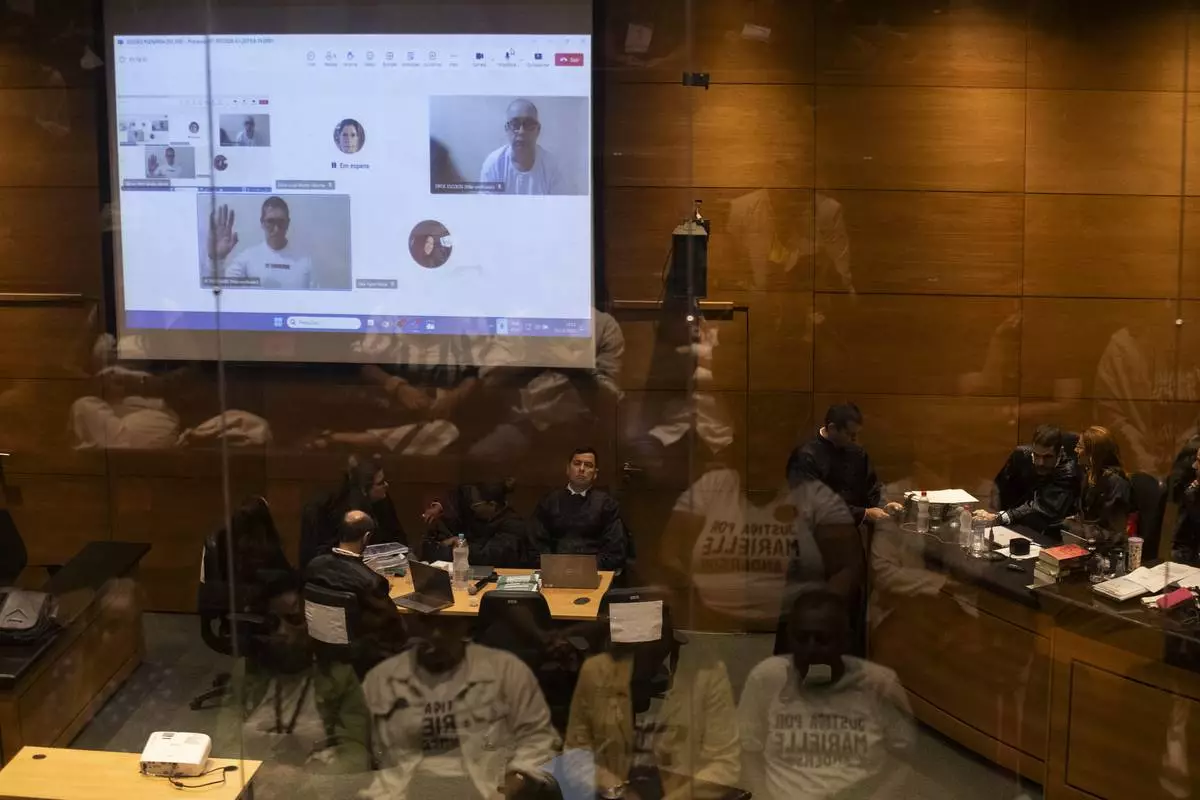
Former military police officers, shown on screen, from left, Ronnie Lessa and Elcio Queiroz attend via video conference their trial where they are accused of murdering city councilwoman Marielle Franco and driver Anderson Gomes, at the Court of Justice in Rio de Janeiro, Wednesday, Oct. 30, 2024. (AP Photo/Bruna Prado)
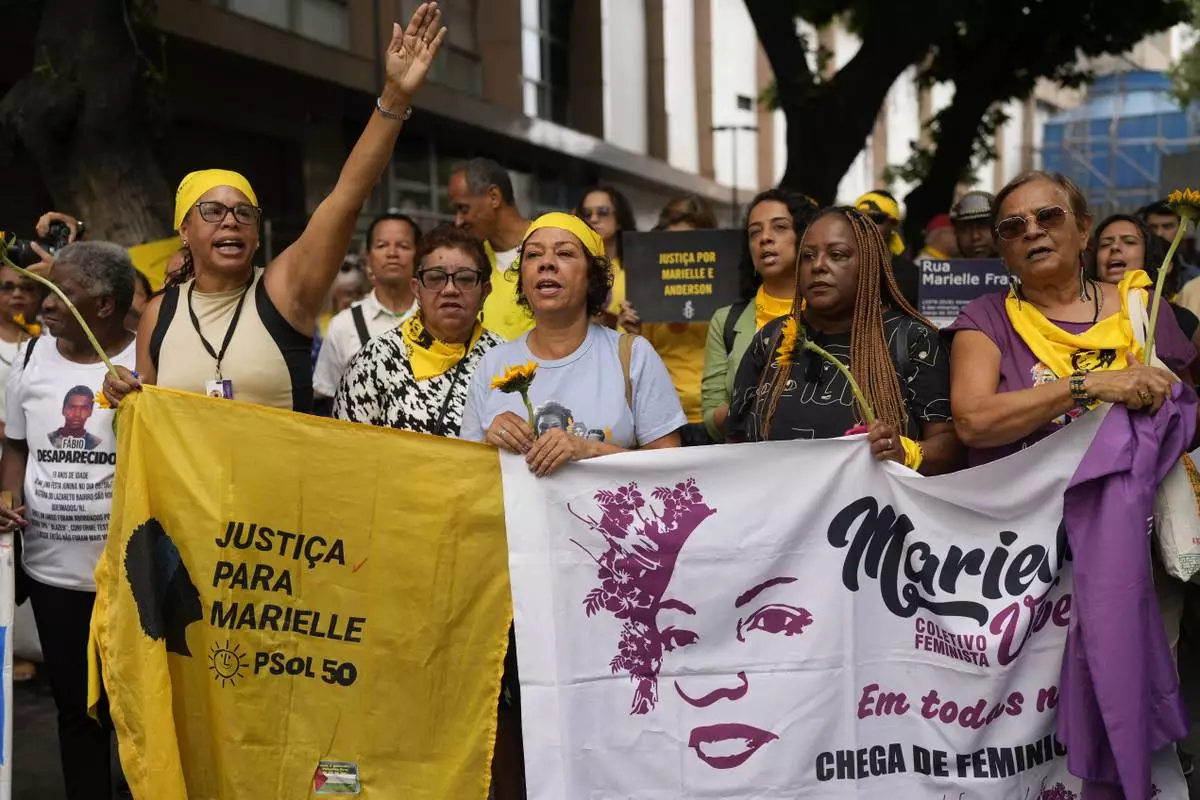
People gather demanding justice before the start of the trial of councilwoman Marielle Franco’s suspected murderers, outside the Court of Justice, in Rio de Janeiro, Brazil, Wednesday, Oct. 30, 2024. (AP Photo/Silvia Izquierdo)
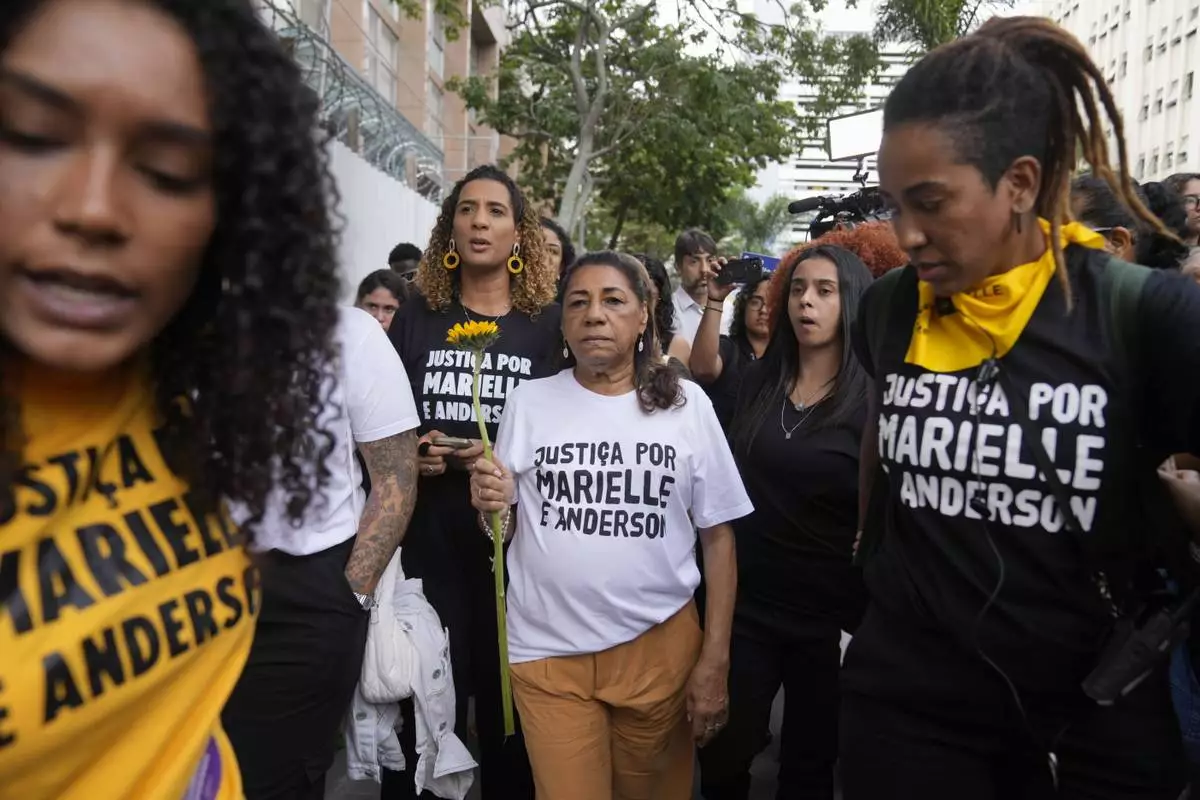
Anielle Franco, left back, and her mother Marinete Silva, center, family members of of slain councilwoman Marielle Franco, arrive to the Court of Justice to attend the trial of Franco’s suspected murderers, in Rio de Janeiro, Brazil, Wednesday, Oct. 30, 2024. (AP Photo/Silvia Izquierdo)
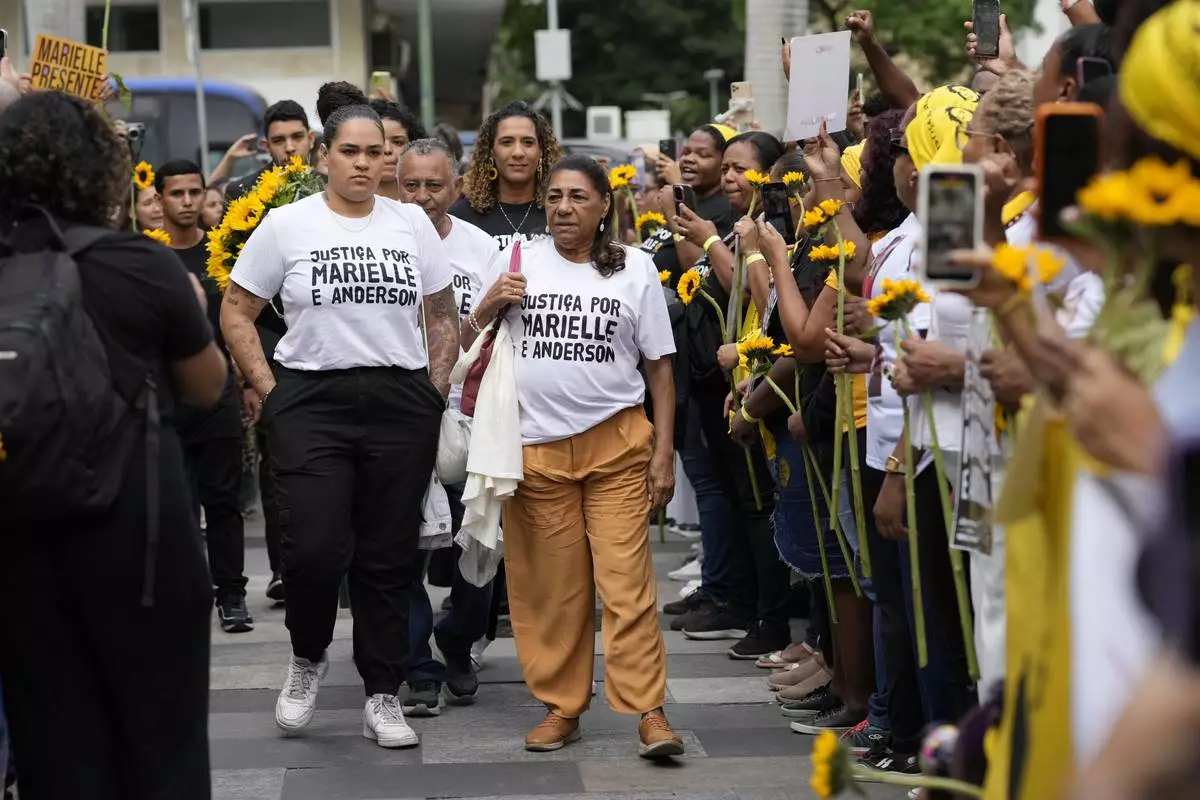
Mother of slain councilwoman Marielle Franco, Marinete Silva, right center, and Luyara Santos, left center, daughter of slain councilwoman Marielle Franco, accompanied by other family members, arrive to follow the trial of former city councilwoman Marielle Franco's alleged killers, in Rio de Janeiro, Brazil, Wednesday, Oct. 30, 2024. (AP Photo/Silvia Izquierdo)

Monica Benicio, center, widow of slain councilwoman Marielle Franco, arrives to the Court of Justice to attend the trial of Franco's suspected murderers, in Rio de Janeiro, Wednesday, Oct. 30, 2024. (AP Photo/Bruna Prado)
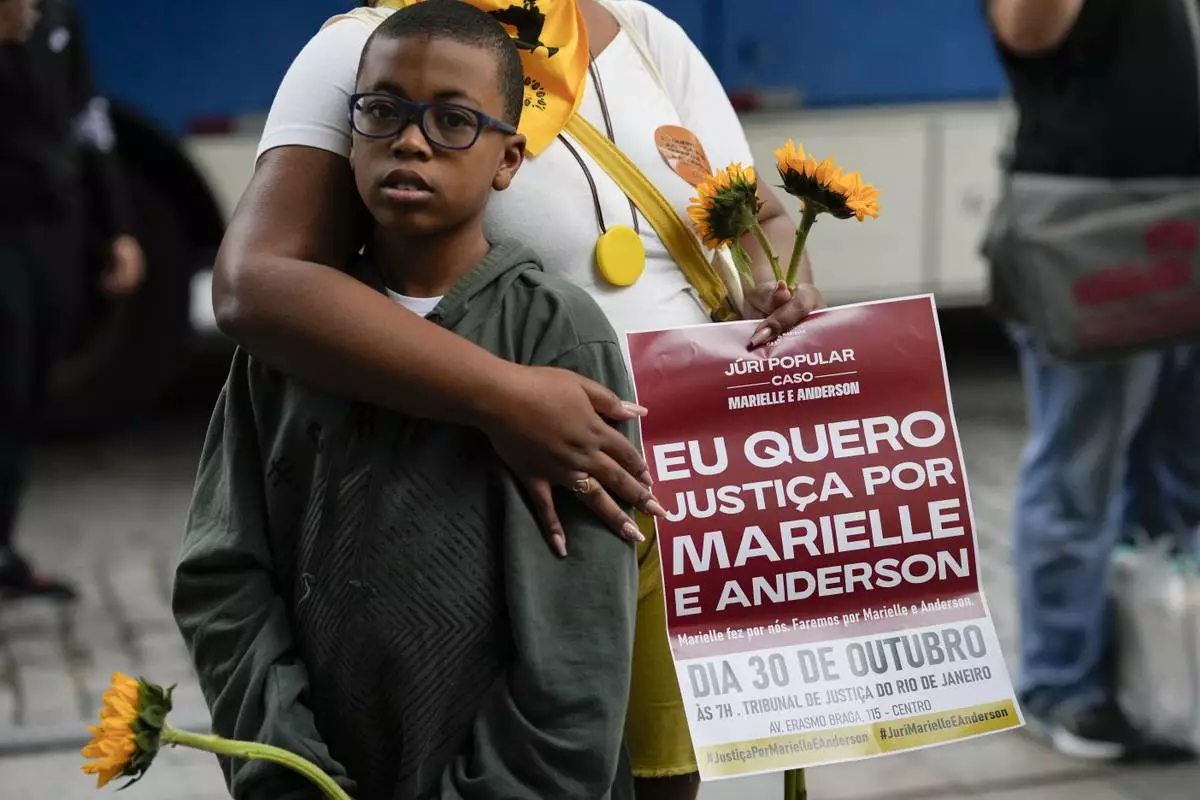
A demonstrator embraces a child while holding a sign with a message that reads in Portuguese: "I want justice for Marielle and Anderson", before the start of the trial of councilwoman Marielle Franco’s suspected murderers, outside the Court of Justice, in Rio de Janeiro, Brazil, Wednesday, Oct. 30, 2024. (AP Photo/Silvia Izquierdo)
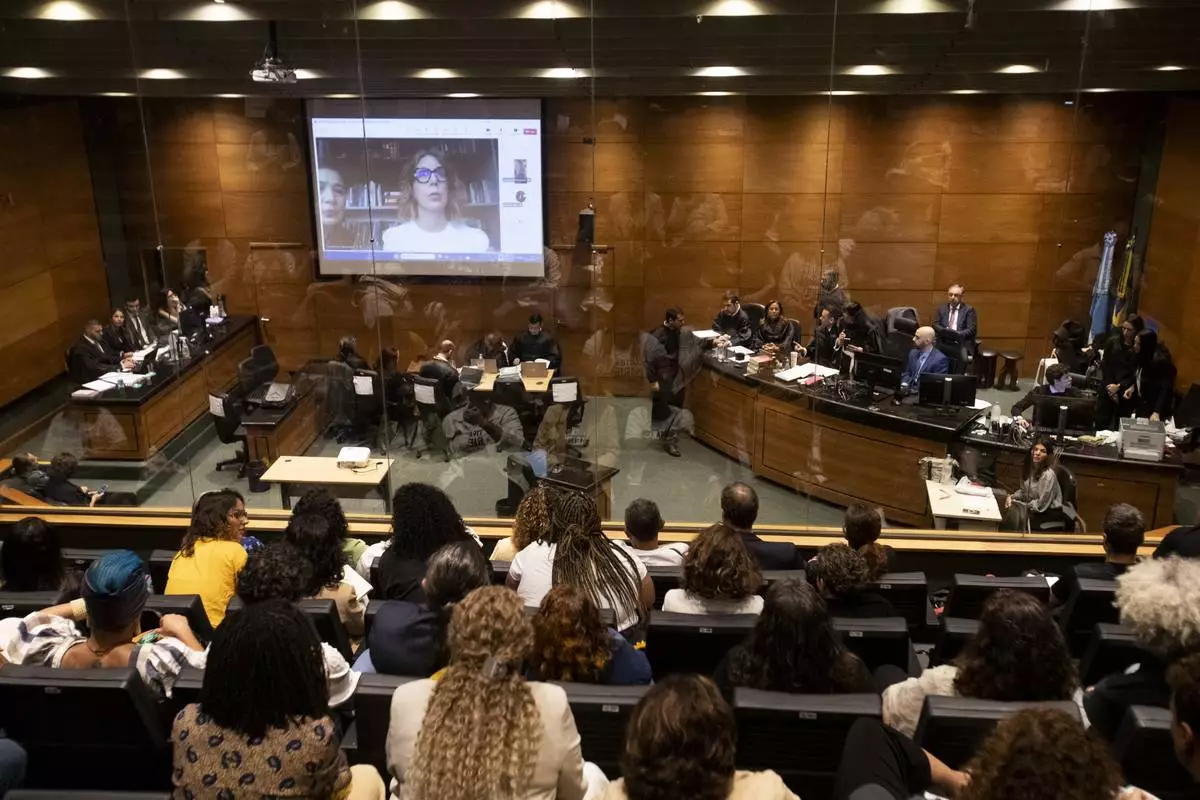
Advisor to slain city councilwoman Marielle Franco, Fernanda Goncalves Chaves, pictured on screen, testifies during the trial of Franco's suspected murderers, at the Court of Justice in Rio de Janeiro, Wednesday, Oct. 30, 2024. (AP Photo/Bruna Prado)
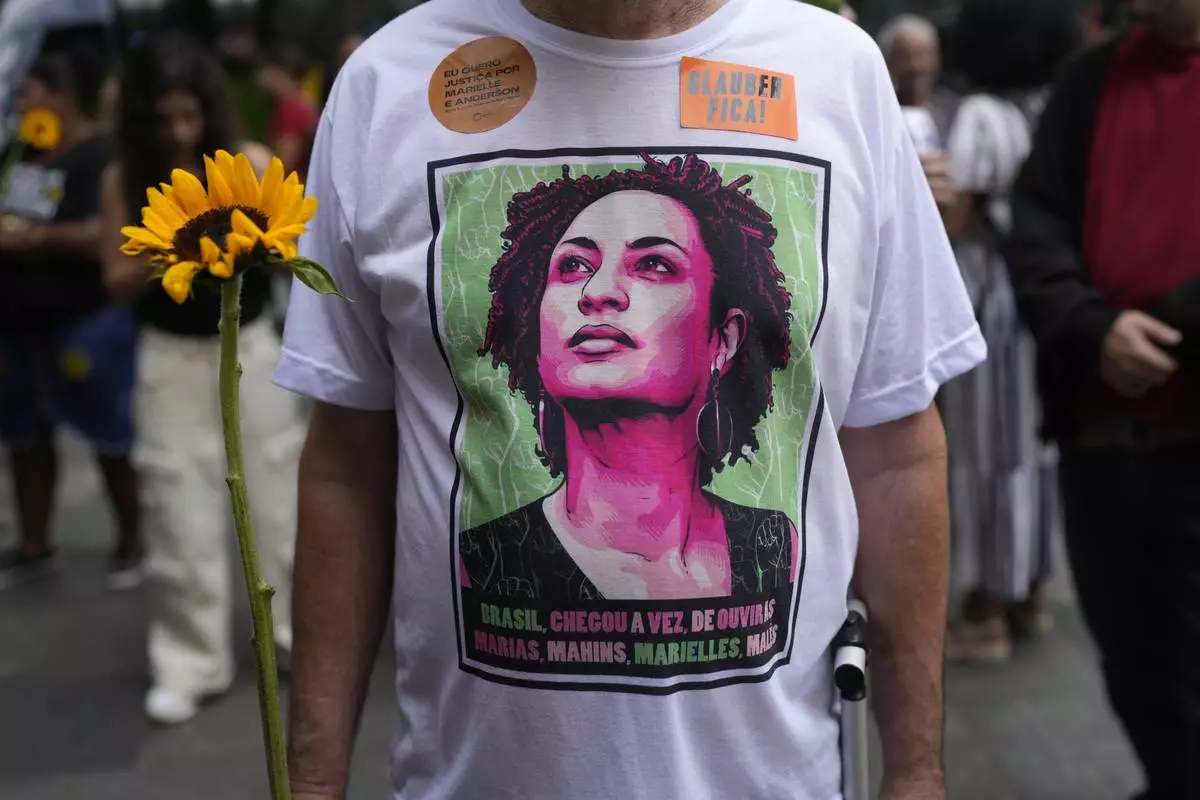
An activist wearing a T-shirt with the image of former city councilwoman Marielle Franco attends a rally prior to the trial for Franco's alleged killers, outside the Court of Justice, in Rio de Janeiro, Wednesday, Oct. 30, 2024. (AP Photo/Silvia Izquierdo)










